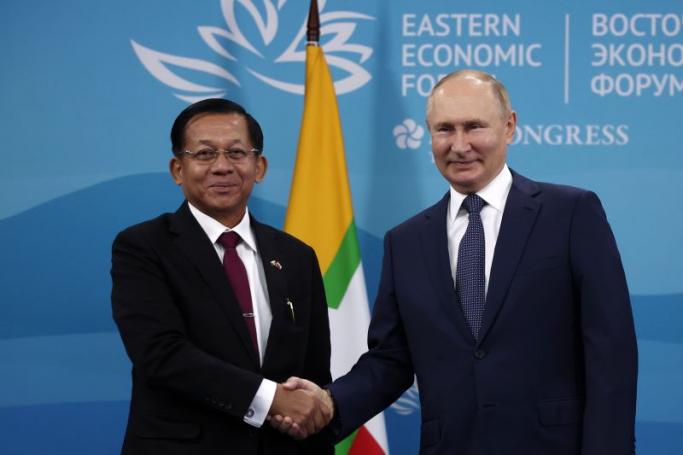Mizzima Editorial
The Myanmar military coup and the country’s isolation as a result have led to Myanmar truly becoming a pawn of the Dragon and the Bear – China and Russia.
As the last toast was raised in Moscow this week by Chinese President Xi Jinping and Russian President Vladimir Putin, the scene appears set for a radical change in the balance of power worldwide, and one way or another Myanmar, currently under the illegal rule of the generals, is along for the ride.
Western media coverage of the visit of Xi to Moscow indicated that the two neighbours – China and Russia – sought an alliance to counteract Western power, with Putin, internationally isolated due to his war in Ukraine, receiving much-needed support.
The West is not amused. US Secretary of State Antony Blinken said Xi's Moscow visit "suggests that China feels no responsibility to hold the president accountable for the atrocities committed to Ukraine. And instead of even condemning, it would rather provide diplomatic cover for Russia to continue to commit those great crimes."
Russia's assault on Ukraine has also deepened fears among Western powers that China could one day try to take control of the self-ruled island of Taiwan, which Beijing views as part of its territory. Pundits “in the know” claim this is a real possibility.
Against this backdrop, it is clear what side the Myanmar junta is on. The visits of junta leader Min Aung Hlaing to Russia since the coup and his hosting of visiting Chinese officials indicate that the Myanmar generals need the handshakes and financial and military support in the face of Western anger and sanctions in response to the February 2021 coup and the war crimes they are committing.
This week, as Xi and Putin trumpeted a “new era” in their relations during Xi’s visit to Moscow, it is important for Myanmar watchers and the Myanmar opposition to recognize the growing power of the alliance the Myanmar military junta has attached its horses to and what this says about the geopolitical situation now and possibly in a post-junta Myanmar.
China and Russia are founding partners of BRICS, an alliance that seeks to challenge US world hegemony and to strike down the dollar as the world’s dominant currency. BRICS – made up of Brazil, Russia, India, China and South Africa – appears to be acting as a magnet for a number of disaffected players. Over a dozen countries – including Iran, Saudi Arabia, and Turkey – are eager to join, with rumours that at least one important European country is showing interest. Thailand and Indonesia are engaged with the alliance - but there is no mention officially at this time of Myanmar joining the fray.
We all need to stand back and look at the shifting sands, aware of what could be termed as the tussle between the West and East. It has been argued that the balance of power in the world is gradually swinging East. The failure of the West to truly recognize what is brewing is perhaps not surprising. BRICS and the meetings they have held since its official founding in 2006 tend to be boring, get minimal Western media coverage and partly as a result the alliance is not afforded the importance it arguably ought to receive. Given the current dire situations of the US and European economies – including fears over the collapse of more banks, following the disaster with Silicon Valley Bank – there should be no surprise that BRICS – particularly the Dragon and Bear – pose a significant challenge to US and European political and economic hegemony worldwide, and to NATO’s forays into Asia.
Depending on your political position, you may view this as a struggle between good and evil. Yet this may be too simple a distinction.
The Myanmar junta is siding with Beijing and Moscow because they are desperate and are in need of the support from these powerful players as international sanctions ratchet up and the pressure grows to add more war crimes charges to Min Aung Hlaing’s plate, on top of the Rohingya “genocide” ICC court case.
Myanmar is currently a pawn of the Dragon and the Bear but this alliance could well be setting the scene for Myanmar’s geopolitical position when eventually – and hopefully - the Spring Revolutionaries win and the Myanmar generals lose power, long down the track though this scenario may be.
Myanmar’s opposition and analysts needs to keep a careful eye on the shifting sands of world geopolitical power. Xi and Putin – as shown this week - are challenging the status quo and it is unclear how this will play out, for good or bad, who can tell?












